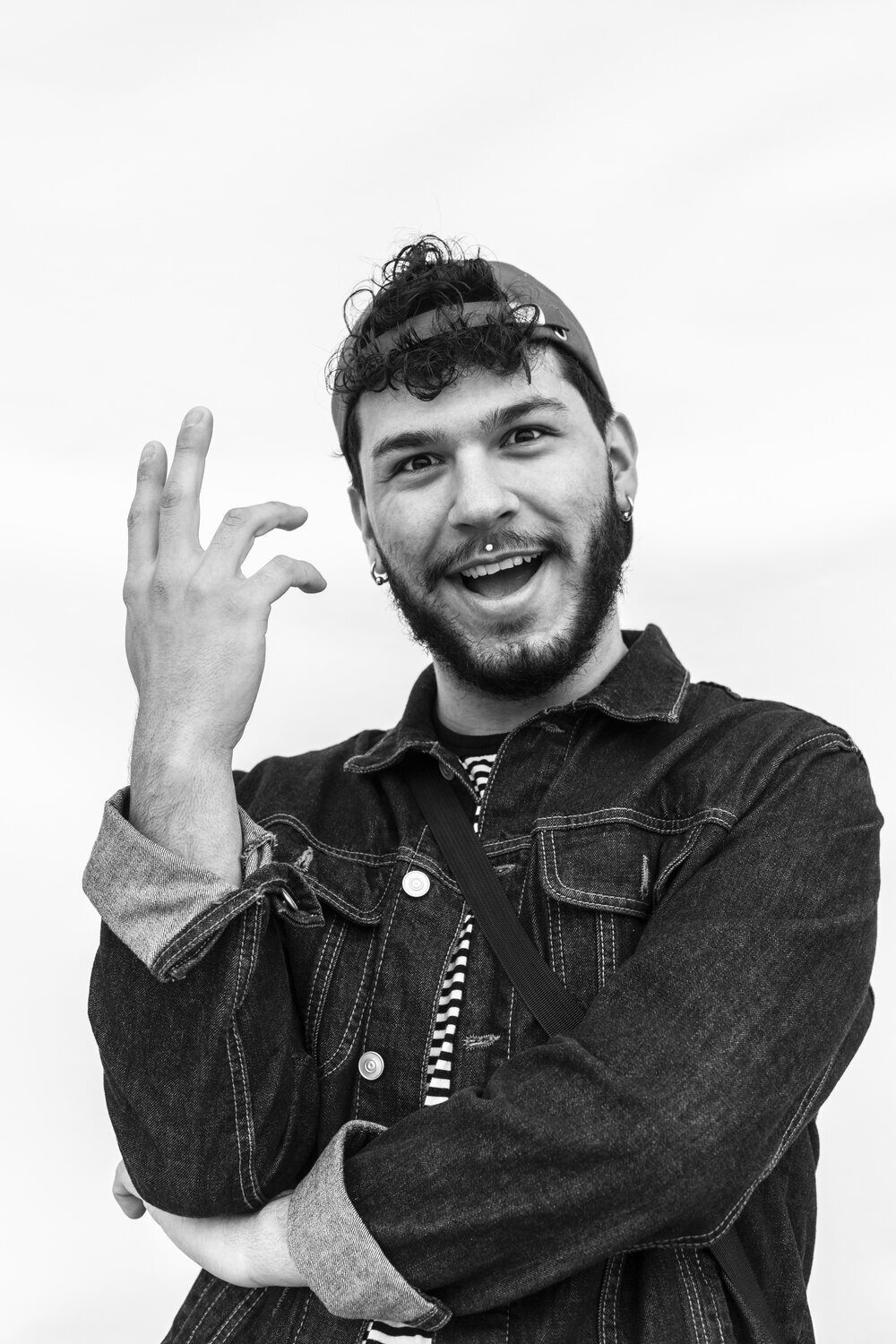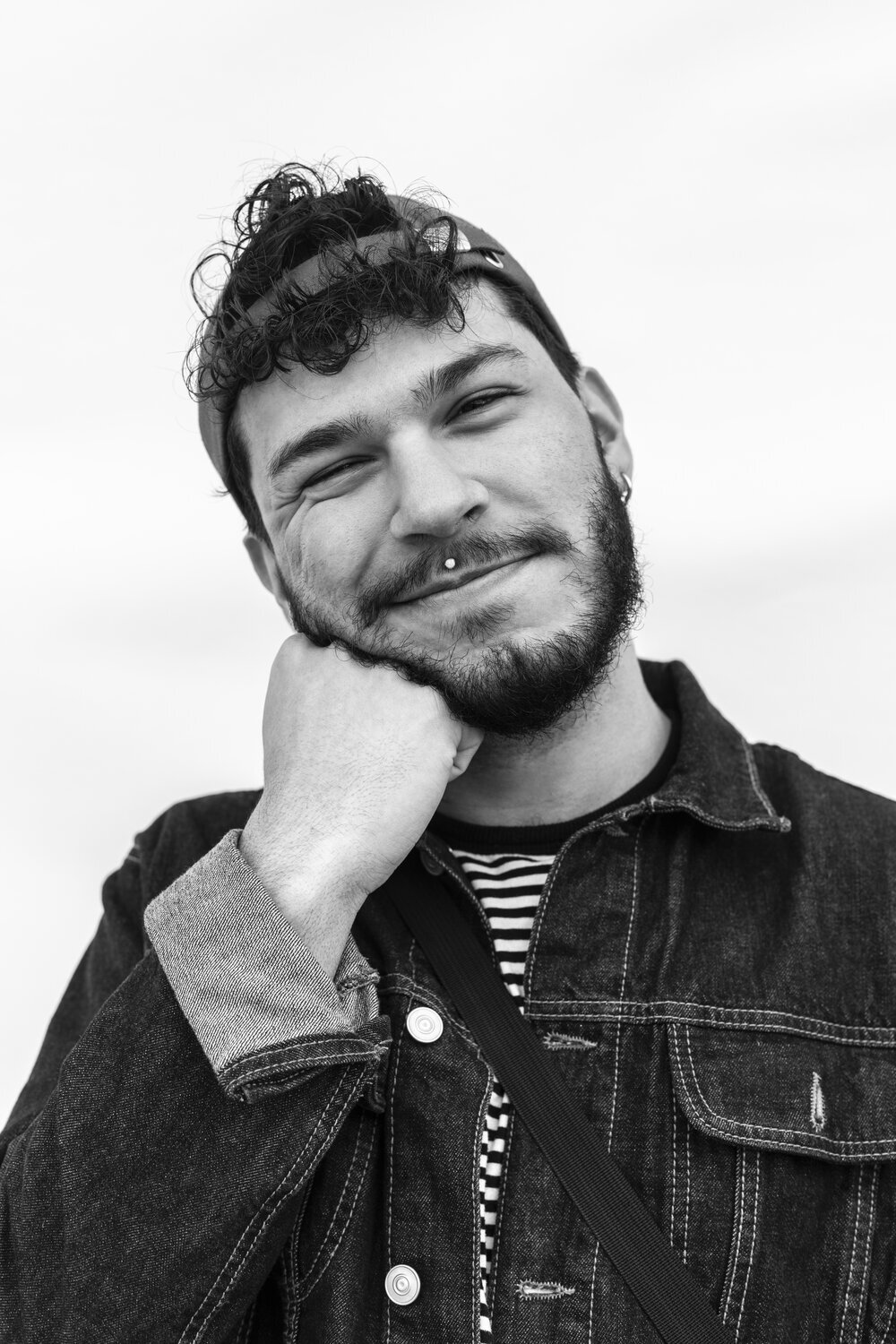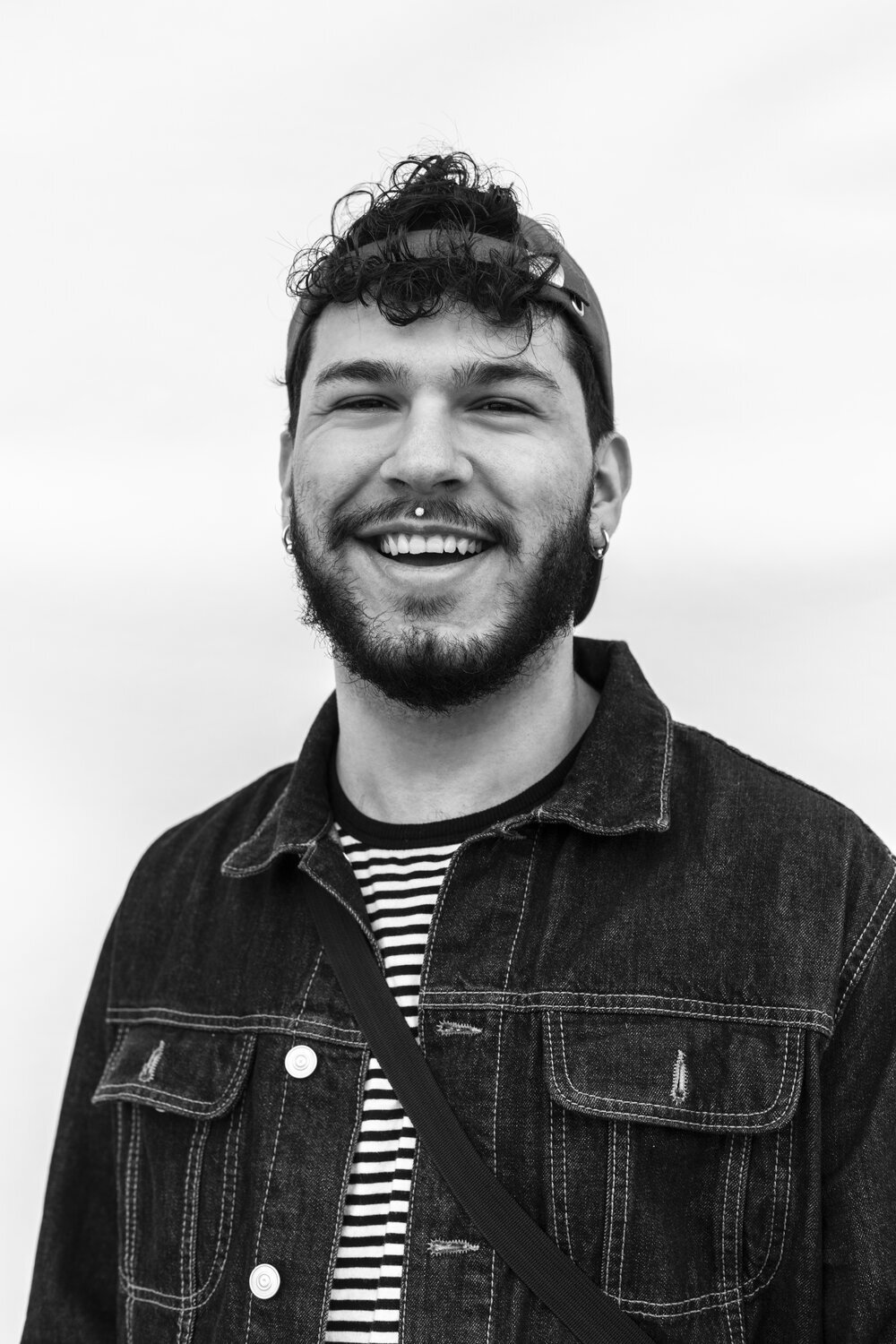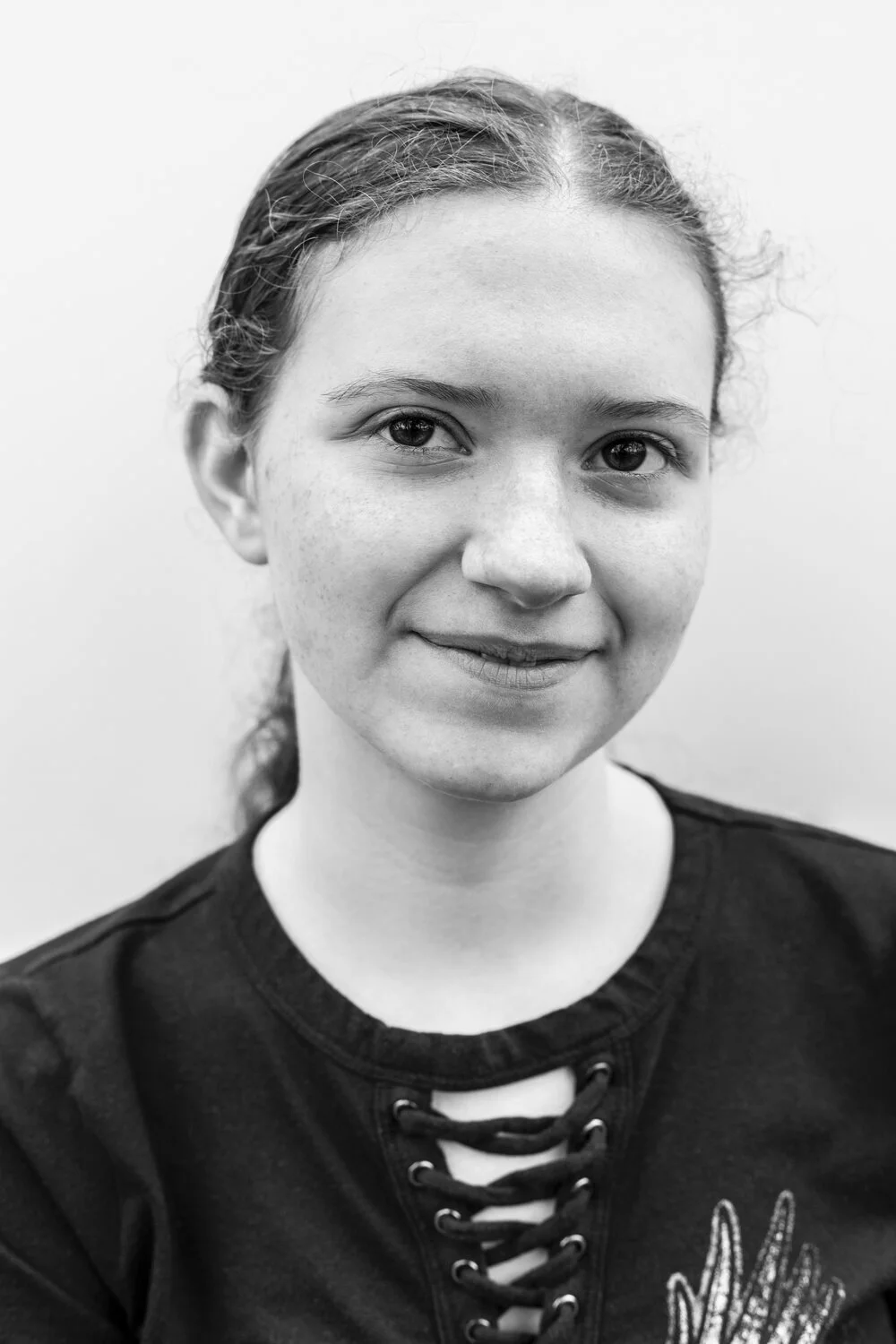LUIS
OKLAHOMA | SERIES # 4
I grew up in a family that had mixed cultures in it. I am mixed myself, Mexican and White. My siblings and I grew up Catholic. I blindly followed the belief system, even though I did not understand much. I understood the many ways a man in my culture and religion were not meant to be. We were not meant to be feminine, we were not meant to show women true respect, we were not meant to be homosexual. Anything else under the sun however was fine. As long as we upheld the machismo and righteous attitude that we were inarguably designed better.
However, I was not designed “better”. I was made the way I am- Queer as hell and nonbinary as heck- though when I was younger, I wasn’t so proud. I tried very hard to fit into the mold of being a religious straight cis Mexican man, because that’s what I was taught “better” was – anything else was less than – Ha! I only laugh because if I had known back then what I know about myself now, I would never amount myself, less than that standard, or any. Yet in the past I was deep in a conformist mode- what kept me in that manner of wanting to blend in was the fear of being different. That fear came with so much confusion due to what I was taught by my culture and family. Family meant unconditional love, because that’s what my mother whispered into my smaller being every moment she could. My culture to me and put on me from my father and any strong men in my life meant pride for having another extension to put all your dreams and expectations on.
My culture taught me that being the manliest man you could be was the most glorious thing a young person like myself could be, but growing up I was not manly whatsoever. Maybe I did not consider myself so because I just didn’t understand why the concept existed, only how being manly functioned.
Never the less I was confused, I knew I was different, and I knew I had nothing in common with these expectations of me- I did not identify with the standards of being manly or the standards of my religion. I was in between masculinity and femininity and I definitely thought boys were cute.
The fear set in that I would not be loved by my family or my culture, and definitely not by the God that ruled over both.
So what did I do?
I tried harder and harder to conform and found myself in a deep dark pit fueled by the hate for myself and others like me. I felt as though I had to trade the love of my family and pride in my culture for the love and pride of myself.
It was such an internal battle and one that I fought alone. A battle that most of us fight alone. I became very good at hiding that struggle and hid my pain between every moment that held bliss in the ignorance.
It was around age eleven when we moved to Oklahoma, the center of the Bible Belt. My mother and father had been divorced for many years, yet religious, machismo characteristics of my heritage was ever present despite my father not being around. Here I finally made friends – friends I felt a strange guilt around. A guilt that I wasn’t being myself, that I was concealing something bad, and that something bad was me.
I did not want to feel that guilt. I wanted to feel accepted. Guilt came with shame, but with acceptance came freedom. Some kind of strength inside of me was bold enough to push faith into the idea of freedom rather than shame, and I told my friends and for the first time. I had come out. I hadn’t even disclosed any of these feelings to my family.
What happened next, I couldn’t have prepared for. All the trust I had put into that moment of confidence with my friends... Failed me. I was outed at school. All over school people knew me as the f slur and gay kid. Friends thought of me as immoral and a sinner. I was excluded from social groups at school and from any normality I could have. I was threatened physically, bullied, and made to feel very unsafe purposely. Not even the teachers helped. My mother, sister, and I moved shortly after I was outed. The spread and reach to my home life was contained. I told no one, for a long time after that.
Then the first little gay miracle I ever had came into my life, and for some reason that gay miracle came in the form of a therapist named Susan. Over time and every many sessions, I finally felt I had someone I could trust my life with. I got to utter the words that I was bisexual. Which at the time felt accurate, but is very inaccurate at describing my sexual orientation now? Now I am not saying all therapists are adept and knowledgeable in handling LGBT youth and young adults, but what transpired after my time with my therapist was a new-found discovery of what beliefs I felt were right and not just blindly believing ones I was taught.
I was provided with information and resources and even attended my first pride and got my first immersion into the larger community. It was when I saw that massive amount of love and sense of something bigger that I knew it was time to come out, maybe not to the world, but to my mom. This was easier to do because my parents were divorced, and I didn’t have to tell my father. Susan, the “gay miracle” (therapist), helped me set up the moment in which I told my mother.
I was fortunate for all the fear and anxiety that had been pent up inside of me to have been blown away when my mother said that she loved me no matter who I loved and that it didn’t make a difference in how she felt.
This is not the case for everyone. That saddens me deep down inside. I feel very privileged to have the mother I have, and if you ever need love from a mom, you can always ask mine.
A short while after this I started attending LGBTQIA youth groups here in Oklahoma City. I was plunged into just such a time of growth and education as a young person. I found words that help describe myself and passions that I never imagined having. I found myself lifelong friends and had a big soul of family for the first time.
These groups built on me and sculpted such a confidence in me that helped me come out to the world. I was unapologetically queer. It appeared my problems were over. Then I looked around and not everyone had that sense of pride... particularly those who had walked in my same religious machismo shoes. Those who had that Latinx, Catholic cultural influence. I lived on the Lantix side of town at this point in my life, and I realized I was more often than not the only person of color in my LGBT groups, which were located in the white neighborhoods.
This fueled even more passion inside of me— that was where the real change could be made. I had to take true control of my intersection and use the visibility of my voice to promote access to resources for people of color and the less privileged.
Coming into my pride as a queer person could not have been accomplished with out activism, awareness, and advocacy. I am now 22 and the path I walked down wasn’t the easiest. It was full of homophobia, racism, sexism, transphobic, classist undertones. It has been a journey working against all those things in a society that pulls us down for who we are and what we are born into. At my age I am fully committed and in love with my community and service to it. I am fully committed to loving myself now and loving the child inside of me who couldn’t love themselves before.
Coming out as non-binary and turning into a local drag entertainer
Between the time when I was 15 to now being 22, I was exposed to drag. Which is the theoretical exaggeration of gender. I considered it the complete humiliation of the concept of gender in our society. In that it made fun of it. It twisted and changed what it meant. It was people literally playing with gender. Something that had been so absolute and concrete in how it defined and sorted us and people. In this playground, I met many people who didn’t subscribe to these rules and roles and learned that I didn’t have to either. It was also around this time that I got to meet a great friend and my first friend whom is non-binary, and whose pronouns are they/them.
I learned from them that I did not have to be a man, or a woman and that gender was more than binary. For I had met trans binary people before and I know I didn’t have to be a man that I could be a woman if I was. But I wasn’t a woman, and I learned I also wasn’t a man. I learned that I didn’t have to be one or the other that I could be in between or above. Or around or whatever.
Shortly after that I came out again as a gender nonbinary. Which in terms also helped me let go of my machismo. It changed my disdain of my Latino heritage to pride in my Latinx queerness. After I understood my gender more, it was time to go into the drag arena myself and make a fool out of the concept of gender. I came into my own as ‘Oasis,’ a beautiful blonde Latina woman. However, it did not feel right. Which was confusing because this is definitely something I wanted to do. A couple of years later I was curious, and I looked up terms nonbinary and drag together. I wanted to know how other people who were non-binary felt when they did drag. I found the term and it wasn’t drag queen or king but DRAG THING. Of course, nonbinary drag was what I had to do. So, I created Topatio- a pun off a popular hot sauce. I wanted to create latinx non-binary visibility that Oklahoma had never seen and what better way to do it other than the form of drag.
Now to this day I am Oklahoma’s first title holding drag thing. I thank drag for helping me with being a voice for myself and my community.
There is so much I want to share with you, reader, so many of my experiences that I hope for you to be able to have as well. I can’t share them all but, I leave you with something one of my friends taught me. I hope to be the friend that teaches you this — your authenticity is one of the most important things that you can live by.
First concern, I would say, should be your own safety. It is unfortunate that not everyone, even those closest to us, are the people who are ready to celebrate in our authenticity with us. The question still looms though- is this person safe to share this with? That is up to you, and it’s okay if it isn’t time to share that with someone. There is no rush. You get to decide when you come out and when you do. All your opportunities are waiting for when you arrive to them.
I hope that sharing my story helped you see yourself a little more, because that’s what our stories are – that’s what your story is – visibility and another queer person seeing themselves more clearly. I couldn’t be the queer person I am today with out such inspiration from queer youth and young adults surviving and thriving in the aftermath. I hope you, dear reader, can thrive in the aftermath of whatever path you go down. I’ll be waiting for you, along with your big queer family, wherever they are.
Now go find them.









